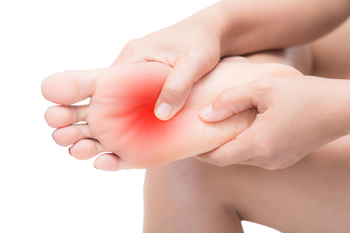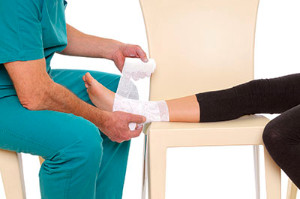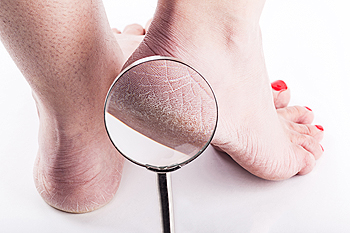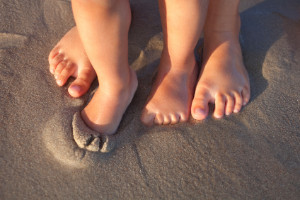 Neuropathy is a condition that affects the feet, specifically causing them to lose feeling. This can be incredibly dangerous, especially if you have developed a serious foot condition and can not feel the symptoms of it. Neuropathy may also alter the shape of your foot. Your arch may be raised, your toes can begin to bend downward, and the bones at the ball of your foot may protrude outward. When the shape of the foot changes, it in turn changes its overall function as well. To keep your feet comfortable, you may want to look into wearing shoes with extra support. Other signs that indicate you may have developed neuropathy include sensations of numbness, stinging, burning, and stabbing aches and pains. Hypersensitivity, as well as dry or cracked skin may develop due to neuropathy. In order to receive a proper diagnosis, and a suggested plan for treatment, we recommend you consult with a podiatrist for professional care.
Neuropathy is a condition that affects the feet, specifically causing them to lose feeling. This can be incredibly dangerous, especially if you have developed a serious foot condition and can not feel the symptoms of it. Neuropathy may also alter the shape of your foot. Your arch may be raised, your toes can begin to bend downward, and the bones at the ball of your foot may protrude outward. When the shape of the foot changes, it in turn changes its overall function as well. To keep your feet comfortable, you may want to look into wearing shoes with extra support. Other signs that indicate you may have developed neuropathy include sensations of numbness, stinging, burning, and stabbing aches and pains. Hypersensitivity, as well as dry or cracked skin may develop due to neuropathy. In order to receive a proper diagnosis, and a suggested plan for treatment, we recommend you consult with a podiatrist for professional care.
Neuropathy
Neuropathy can be a potentially serious condition, especially if it is left undiagnosed. If you have any concerns that you may be experiencing nerve loss in your feet, consult with one of our podiatrists from Riznyk Podiatry. Our doctors will assess your condition and provide you with quality foot and ankle treatment for neuropathy.
What Is Neuropathy?
Neuropathy is a condition that leads to damage to the nerves in the body. Peripheral neuropathy, or neuropathy that affects your peripheral nervous system, usually occurs in the feet. Neuropathy can be triggered by a number of different causes. Such causes include diabetes, infections, cancers, disorders, and toxic substances.
Symptoms of Neuropathy Include:
Those with diabetes are at serious risk due to being unable to feel an ulcer on their feet. Diabetics usually also suffer from poor blood circulation. This can lead to the wound not healing, infections occurring, and the limb may have to be amputated.
Treatment
To treat neuropathy in the foot, podiatrists will first diagnose the cause of the neuropathy. Figuring out the underlying cause of the neuropathy will allow the podiatrist to prescribe the best treatment, whether it be caused by diabetes, toxic substance exposure, infection, etc. If the nerve has not died, then it’s possible that sensation may be able to return to the foot.
Pain medication may be issued for pain. Electrical nerve stimulation can be used to stimulate nerves. If the neuropathy is caused from pressure on the nerves, then surgery may be necessary.
If you have any questions, please feel free to contact our office located in Orchard Park, NY . We offer the newest diagnostic and treatment technologies for all your foot care needs.
 If you have endured an ankle sprain, it may have happened as a result of suddenly rolling your ankle. This can occur from stepping off of a curb unexpectedly, or from tripping on an unseen object. An eversion sprain generally targets the inner part of the ankle, and may affect the arch of the foot. If the ankle rolls outward, it is known as an inversion sprain, and may cause the ligaments to stretch or tear. There are common symptoms that are associated with ankle sprains. These can include severe pain and discomfort, swelling, and it may be difficult to move or bend the ankle. Moderate relief can be found if the affected foot is taped with an elastic bandage, and this may help to provide the support that is needed as the healing process takes place. If you have sprained your ankle, it is strongly suggested that you seek the counsel of a podiatrist who can guide you toward the correct treatment.
If you have endured an ankle sprain, it may have happened as a result of suddenly rolling your ankle. This can occur from stepping off of a curb unexpectedly, or from tripping on an unseen object. An eversion sprain generally targets the inner part of the ankle, and may affect the arch of the foot. If the ankle rolls outward, it is known as an inversion sprain, and may cause the ligaments to stretch or tear. There are common symptoms that are associated with ankle sprains. These can include severe pain and discomfort, swelling, and it may be difficult to move or bend the ankle. Moderate relief can be found if the affected foot is taped with an elastic bandage, and this may help to provide the support that is needed as the healing process takes place. If you have sprained your ankle, it is strongly suggested that you seek the counsel of a podiatrist who can guide you toward the correct treatment.
Ankle sprains are common but need immediate attention. If you need your feet checked, contact one of our podiatrists from Riznyk Podiatry. Our doctors can provide the care you need to keep you pain-free and on your feet.
How Does an Ankle Sprain Occur?
Ankle sprains take place when the ligaments in your ankle are torn or stretched beyond their limits. There are multiple ways that the ankle can become injured, including twisting or rolling over onto your ankle, putting undue stress on it, or causing trauma to the ankle itself.
What Are the Symptoms?
Preventing a Sprain
Treatment of a Sprain
Treatment of a sprain depends on the severity. Many times, people are told to rest and remain off their feet completely, while others are given an air cast. If the sprain is very severe, surgery may be required.
If you have suffered an ankle sprain previously, you may want to consider additional support such as a brace and regular exercises to strengthen the ankle.
If you have any questions please feel free to contact our office located in Orchard Park, NY . We offer the newest diagnostic and treatment technologies for all your foot and ankle needs.
 Severe cases of the condition known as cracked heels can cause extreme pain and discomfort. They are deep cracks in the skin that are known as fissures, and generally occur on the outside of the heel. It is an ailment that develops gradually, and will be manageable with prompt treatment. Some of the symptoms of cracked heels can include flaky and peeling skin, hardened and red skin, and the area may itch. Common causes of this condition can consist of standing for extended periods of time throughout the day, and wearing shoes that do not fit correctly. Additionally, certain medical conditions such as psoriasis and thyroid disease may play a significant role in developing cracked heels. Relief may be temporarily felt when a good moisturizer is applied to the affected area. If you would like more information about how to treat and prevent cracked heels from developing, it is suggested that you speak to a podiatrist.
Severe cases of the condition known as cracked heels can cause extreme pain and discomfort. They are deep cracks in the skin that are known as fissures, and generally occur on the outside of the heel. It is an ailment that develops gradually, and will be manageable with prompt treatment. Some of the symptoms of cracked heels can include flaky and peeling skin, hardened and red skin, and the area may itch. Common causes of this condition can consist of standing for extended periods of time throughout the day, and wearing shoes that do not fit correctly. Additionally, certain medical conditions such as psoriasis and thyroid disease may play a significant role in developing cracked heels. Relief may be temporarily felt when a good moisturizer is applied to the affected area. If you would like more information about how to treat and prevent cracked heels from developing, it is suggested that you speak to a podiatrist.
Cracked heels are unsightly and can cause further damage to your shoes and feet. If you have any concerns, contact one of our podiatrists from Riznyk Podiatry. Our doctors can provide the care you need to keep you pain-free and on your feet.
Cracked Heels
Cracked heels appear unappealing and can make it harder for you walk around in sandals. Aside from looking unpleasant, cracked heels can also tear stockings, socks, and wear out your shoes. There are several methods to help restore a cracked heel and prevent further damage.
How Do You Get Them?
Dry skin is the number one culprit in creating cracked heels. Many athletes, walkers, joggers, and even swimmers suffer from cracked heels. Age and skin oil production play a role to getting cracked heels as well.
Promote Healing
Over the counter medicines can help, especially for those that need instant relief or who suffer from chronic dry feet.
Wear Socks – Wearing socks with medicated creams helps lock in moisture.
Moisturizers – Applying both day and night will help alleviate dryness which causes cracking.
Pumice Stones – These exfoliate and remove dead skin, which allows for smoother moisturizer application and better absorption into the skin.
Change in Diet
Eating healthy with a well-balanced diet will give the skin a fresh and radiant look. Your body responds to the kinds of food you ingest. Omega-3 fatty acids and zinc supplements can also revitalize skin tissue.
Most importantly, seek professional help if unsure how to proceed in treating cracked heels. A podiatrist will help you with any questions or information needed.
If you have any questions, please feel free to contact our office located in Orchard Park, NY . We offer the newest diagnostic and treatment technologies for all your foot care needs.
 When babies are born, their feet are generally soft and flexible. Research has shown the feet may become stronger when walking is done barefoot while indoors. This may help to strengthen the overall foot as the toes grasp the floor for balance. When the first pair of shoes are purchased, it is helpful that the shoes are made of lightweight and breathable materials. Additionally, there needs to be adequate room at the top of the shoes so the toes can move freely. This may help to prevent ingrown toenails from developing. Good foot hygiene begins with teaching your child how to properly wash and dry their feet, in addition to helping them to stretch their feet. If you would like more information about how to care for children’s feet, please consult with a podiatrist.
When babies are born, their feet are generally soft and flexible. Research has shown the feet may become stronger when walking is done barefoot while indoors. This may help to strengthen the overall foot as the toes grasp the floor for balance. When the first pair of shoes are purchased, it is helpful that the shoes are made of lightweight and breathable materials. Additionally, there needs to be adequate room at the top of the shoes so the toes can move freely. This may help to prevent ingrown toenails from developing. Good foot hygiene begins with teaching your child how to properly wash and dry their feet, in addition to helping them to stretch their feet. If you would like more information about how to care for children’s feet, please consult with a podiatrist.
The health of a child’s feet is vital to their overall well-being. If you have any questions regarding foot health, contact one of our podiatrists of Riznyk Podiatry. Our doctors can provide the care you need to keep you pain-free and on your feet.
Tips for Keeping Children's Feet Healthy
If you have any questions, please feel free to contact our office located in Orchard Park, NY . We offer the newest diagnostic and treatment technologies for all your foot care needs.